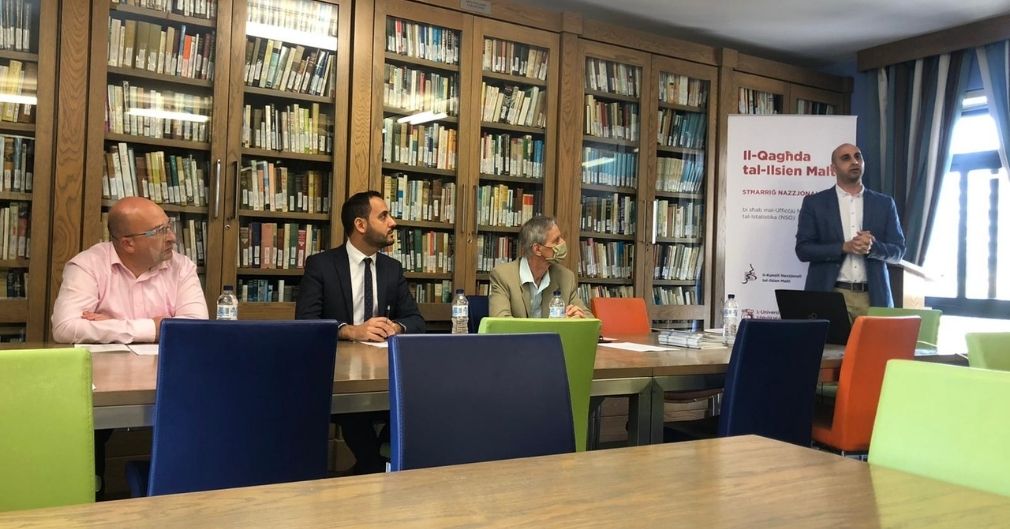Il-Kunsill Nazzjonali tal-Ilsien Malti u d-Dipartiment tal-Malti fl-Università għamlu stħarriġ bi sħab mal-Uffiċċju Nazzjonali tal-Istatistika fuq l-użu tal-Malti u l-Ingliż f’sitwazzjonijiet soċjali differenti. L-istħarriġ sar fuq kampjun ta’ ftit aktar minn elf ruħ ta’ bejn 18 u 80 sena biċ-ċittadinanza Maltija.
Ir-riżultati jindikaw li 97% tal-parteċipanti jqisu l-Malti bħala l-ewwel lingwa u juru ċar li f’Malta, pajjiż bilingwi espost ħafna għall-Ingliż, b’mod speċjali fil-kummerċ, fit-tagħlim, fil-komunikazzjoni u fil-ħajja ta’ kuljum, il-Malti hu b’saħħtu ħafna anki fost iż-żgħażagħ. Xejra ġenerali li jindika l-istħarriġ hi li biex int tirnexxi, biex toffri x-xogħol tiegħek, u biex toffri servizzi u prodotti fis-suq lokali, il-Malti hu u se jibqa’ importanti għall-komunikazzjoni mal-impjegaturi u mal-klijenti.
L-istħarriġ juri li l-Malti u l-Ingliż, aktar milli qegħdin f’kompetizzjoni, jikkumplimentaw lil xulxin u jintużaw f’ċirkostanzi differenti, ngħidu aħna, fil-kitba u fit-taħdit. Joħroġ ukoll li l-Maltin iridu aktar materjal bil-Malti, imma mhux a skapitu tal-Ingliż. Il-biċċa l-kbira tal-Maltin jaqblu li s-siti tal-Gvern, l-ittri u l-fuljetti li jirċievu d-dar, il-formoli u d-dokumenti uffiċjali, u t-tabelli tal-binjiet u l-postijiet pubbliċi għandhom ikunu bil-Malti u bl-Ingliż. Fattur interessanti li joħroġ b’mod statistiku minn dan l-istħarriġ hu li l-parteċipanti jqisu r-reklami bil-Malti aktar effettivi. Barra minn hekk, il-Maltin jixtiequ jisimgħu iżjed mużika bil-Malti fuq ir-radjijiet.
Il-Kunsill tal-Malti u d-Dipartiment tal-Malti jemmnu li l-istħarriġ jixħet ukoll dawl fuq l-oqsma li hi meħtieġa aktar ħidma fihom biex inkomplu nsaħħu l-ħiliet fil-Malti u fl-Ingliż u, idealment fit-tielet lingwa, kif tirrakkomanda l-Unjoni Ewropea. Iż-żewġ entitajiet tal-Malti impenjati biex jaħdmu fuq dan mal-individwi u l-organizzazzjonijiet konċernati
flimkien ma’ kull min hu lest jaħdem b’risq l-użu ndaqs taż-żewġ ilsna ta’ pajjiżna ħalli nkomplu nsarrfu l-bilingwiżmu uffiċjali tagħna fil-prattika.
Għar-rapport dettaljat u għal aktar tagħrif, idħol f’din il-paġna.
_ _ _
National Survey on the State of the Maltese Language
The National Council for the Maltese Language and the Department of Maltese at the University of Malta, in collaboration with the National Statistics Office, have conducted a national survey on the use of Maltese and English in different social situations. The survey was carried out on a sample of over 1,000 Maltese citizens between the ages of 18 and 80.
The results show that 97% of respondents consider Maltese to be their first language. The study also clearly shows that, in a bilingual country that is greatly exposed to English, especially in domains, such as commerce, education, mass communication, as well everyday life situations, Maltese is very strong, also among the younger generation.
A general tendency that also emerges from the survey is that if you want to succeed and to offer your work, services and products on the local market, Maltese is and will remain important for communication with both employers and clients.
The survey shows that Maltese and English, rather than being in competition, complement each other and are used in different situations, for example, in speaking and in writing. It also emerges that the Maltese want more material in Maltese, though not at the expense of English. Most agree that government websites, letters and leaflets
they receive at home, official forms and documents, and public signs and notices in public places and buildings should be in both Maltese and English. An interesting statistical fact that emerges from the study is that respondents consider adverts in Maltese to be more effective, and, moreover, that they would like to listen to more
music in Maltese on the radio.
The National Council for the Maltese Language and the Department of Maltese believe that the survey also sheds light on those areas in which more work needs to be done to strengthen language skills in Maltese and English and, ideally, also in a third language, as recommended by the European Union. To this end, the two Maltese entities are
committed to work with the individuals and organisations concerned, as well as with anyone who is prepared to work in favour of a balanced use of the two official languages of Malta so that we can have a society that is not only officially bilingual but also bilingual in practice.
The report associated with this study may be accessed online.

